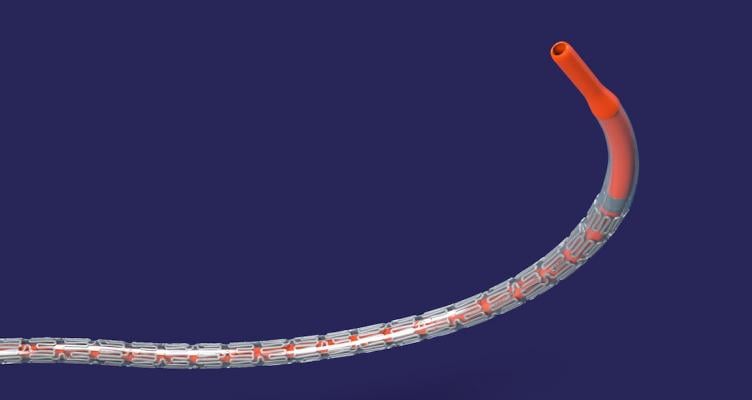
October 16, 2020 – Results from the XIENCE 90/28 clinical trials have shown that a shorter course of dual-antiplatelet therapy (DAPT) after percutaneous coronary intervention (PCI) was noninferior to standard DAPT up to 12 months. Findings were reported today at 2020 Transcatheter Cardiovascular Therapeutics (TCT) Connect virtual symposium of the Cardiovascular Research Foundation (CRF).
The trial adds more validity to shortening DAPT in patients who are at higher risk for bleeding. It comes on the heels of the U.S. FDA approving the first shortened DAPT indication for the Medtronic Resolute Onyx drug-eluting stent (DES) for one-month of DAPT.
Extended duration of DAPT after PCI increases the risk of bleeding, which is associated with worse outcomes and quality of life, especially among patients at high bleeding risk (HBR). Recent clinical trials on newer generation drug-eluting stents have shown an acceptable safety profile with a short course of DAPT. However, the optimal DAPT duration in HBR patients undergoing PCI remains unknown.
The XIENCE 28 and XIENCE 90 trials were prospective, single-arm, multicenter, open-label nonrandomized trials conducted to evaluate the safety of one-month (28) or three-month (90) DAPT in HBR patients undergoing PCI with the XIENCE everolimus-eluting stent. The primary endpoint evaluated safety (all-cause death or myocardial infarction) of a short DAPT regimen (one or three months) compared to DAPT up to 12 months. The secondary endpoints were the incidence of clinically relevant bleeding (BARC 2-5) and stent thrombosis (definite/probable) against a performance goal (only for XIENCE 90). The XIENCE V USA post-approval study served as the historical control group through a propensity score stratified analysis.
“Among high bleeding risk patients undergoing PCI with the XIENCE stent, a short DAPT regimen of one or three months compared with standard DAPT up to 12 months resulted in non-inferior ischemic outcomes and similar rates of clinically relevant (BARC 2-5) bleeding, with a significant reduction in major (BARC 3-5) bleeding. Additionally, there was a very low incidence of stent thrombosis.” said Roxana Mehran, M.D. She is The Mount Sinai professor of clinical research and outcomes, professor of medicine (cardiology), population health science and policy, Icahn School of Medicine at Mount Sinai and director of interventional cardiovascular research and clinical trials, The Zena and Michael A. Wiener Cardiovascular Institute, Icahn School of Medicine at Mount Sinai.
After successful PCI, enrolled patients in XIENCE 28 were prescribed one month of DAPT while patients in XIENCE 90 were prescribed three months of DAPT. Those who were free from ischemic events and adhered to the antiplatelet regimen during the first one month or three months received “one-month” or “three-month” clear assessments. Clear subjects were eligible to be placed on antiplatelet monotherapy (aspirin) from one or three months to 12 months.
The XIENCE 90 study demonstrated similar rates of all death or MI between three and 12 months in the test group versus the control (5.4% vs. 5.4%, one-sided 97.5% UCL: 2.23%, p non-inferiority=0.0063). XIENCE 28 also demonstrated non-inferiority of death or MI in the test group between one and six months (3.5% vs.4.3%, one-sided 97.5% UCL: 0.97%, p non-inferiority = 0.0005). For the secondary endpoint, the incidence of bleeding (BARC 2-5) was 5.1% vs. 7.0% (p superiority=0.0687 in XIENCE 90 and 4.9% vs. 5.9% (p superiority=0.19) in XIENCE 28. Major bleeding (BARC 3-5) was significantly reduced in both trials (XIENCE 90: 2.2% vs. 6.3%, p superiority<0.0001; XIENCE 28: 2.2% vs. 4.5%, p superiority=0.0156).
The XIENCE 90-28 trials were funded by Abbott.
Dr. Mehran reported the followings disclosures: consultant/advisory/speaking engagements for Abbott Laboratories (to institution), Abiomed (spouse), Boston Scientific, Idorsia Pharmaceuticals Ltd. (no fee), Janssen, Medscape/WebMD, Medtelligence (Janssen Scientific Affairs), Roivant Sciences Inc., Sanofi, Siemens Medical Solutions, Regeneron Pharmaceuticals (no fee), Spectranetics/Philips/Volcano Corp. (to institution), and The Medicines Company (spouse); research funding to institution from Abbott,
Abiomed, AstraZeneca, Bayer, Beth Israel Deaconess, BMS, CERC, Chiesi, Concept Medical, CSL Behring, DSI, Medtronic, Novartis, and OrbusNeich; Scientific Advisory Board from Bristol Myers Squibb (to institute), Medtelligence (Janssen Scientific Affairs), and Merck (spouse); equity (less than 1%) from Claret Medical and Elixir Medical; DSMB membership paid to institution from Watermark Research Partners; and associate editor at ACC and AMA.
Dr. Valgimigli reported the following disclosures: grant/research support from Daiichi Sankyo, Medicure, Terumo, and CoreFLOW; and consulting fees/honoraria from Abbott, Alvimedica/CID, AstraZeneca, Bayer, CoreFLOW, Chiesi, IDORSIA, Bristol Myers Squib SA, Medscape, Vesalio, and Universität Basel Dept. Klinische Forschung.
For more information: www.tctconference.com
Find additional TCT 2020 news, video and late-breaking studies
Related Shorten DAPT Content:
Medtronic Resolute Onyx Drug Eluting Stent First to Receive One-Month DAPT Indication - October 1, 2020
VIDEO: Overview of Short DAPT in High-risk Bleeding Patients Who Receive Stents — Interview with Robert Harrington, M.D.
6 Hot Topics in Interventional Cardiology at TCT 2019
VIDEO: Early Discontinuation of DAPT in High Bleeding Risk Patients With the Synergy Stent. — Interview with Ajay Kirtane, M.D.
VIDEO: TWILIGHT Trial Shows Benefit to Ticagrelor Monotherapy After Stent Implantation — Interview with Roxana Mehran, M.D.
Resolute Onyx Drug-Eluting Stent Noninferior to Polymer-Free Drug-Coated Stent With One-Month DAPT
Medtronic Announces Global Resolute Onyx DES One-Month DAPT Study


 August 28, 2023
August 28, 2023 









